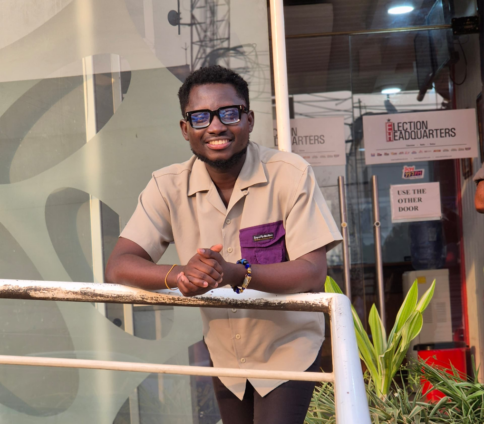My name is Anthony Manu, and I stammer.
For many, speaking is effortless—a simple act taken for granted. A thought forms, and within seconds, it becomes words, spoken freely and confidently. But for some of us, speaking is a battlefield. Every word is a struggle, every sentence a fight against an invisible force that holds the tongue hostage.
Stammering is more than just a speech disorder; it’s a shadow that follows you everywhere. It turns everyday conversations into challenges, makes simple introductions feel like impossible tasks, and sometimes silences you completely. Many people don’t understand what it feels like to want to speak but be unable to. To have the words in your mind but struggle to push them out. To watch others finish your sentences because they assume you need help. To be laughed at for something you cannot control.
I know that feeling all too well.
A silent childhood
My journey with stammering began in childhood, shaping my self-perception in ways I never expected. As a lower primary school student, I dreaded the sound of my own voice. Every attempt to speak felt like an uphill battle—one I rarely won. When I did manage to get words out, they often came with broken pauses and, worse, laughter from my classmates.
So, I stopped trying.
I had answers in my head but was too afraid to raise my hand. I wanted to ask questions but the thought of stumbling over my words was unbearable. My silence made me invisible. But even worse, it made me believe I was incapable. School became a nightmare, not just because I stammered but because I was failing. My exercise books were filled with red marks, my test scores were among the lowest in class, and group work felt like torture. No one expected much from me. And soon, I stopped expecting much from myself.

Some days, after school, I cried. I never spoke about it, never told anyone how much it hurt to be trapped inside my silence. I was drowning in words I couldn't say, and no one noticed.
Then came Sir Dominic.
A Teacher who saw Beyond my Stammer
He wasn’t just a teacher—he was different. He saw the struggle I tried to hide, and for reasons I didn’t understand at the time, he decided to help. But instead of forcing me to speak, he gave me a pen.
"Since your voice fails you, let’s make you powerful with your writing," he said.
At first, I hated it. He gave me extra work, special assignments, and more exercises than any other pupil. It felt like punishment. Why was he making me do more when I was already struggling with less?
But then something changed.
By Primary 5, I was no longer just another struggling pupil; I had climbed from the bottom to the second-best in class. By Primary 6, I was at the top. My classmates still knew I stammered, but they didn’t laugh like before. Because now I had something they respected. I had my pen. I had my mind. I had a voice—one that didn’t need perfect speech to be heard.
This newfound strength carried me through Junior High School, where remarkable teachers like Mr. Baah, Madam Mavis, Madam Leticia, Mr. Gyabah, Madam Beatrice, and Mr. Karikari (now the DCE for Atwima Kwanwoma) nurtured my academic abilities. Their guidance, coupled with my relentless effort, earned me a place at Prempeh College, one of Ghana’s top Senior High Schools.
But while my academic strength grew, communication remained a challenge. In class discussions, I often found myself hesitating. Yet, an interesting pattern emerged; when put on the spot, I spoke better. The first few words might have glitches, but once I found my rhythm, I could express myself.
Breaking the Silence in University
My transformation became even clearer at the University of Ghana, where I studied Economics and Mathematics. In academic writing and group discussions, I found myself leading presentations. I took on teaching roles, tutoring my peers, and even teaching Economics and Elective Mathematics during internships.
Standing in front of a class, breaking down complex concepts, and helping others understand; it felt good. It felt powerful. In my Industrial Economics class, I spoke so much during discussions that my lecturer jokingly called me a talkative.
That was a defining moment.
The boy who once hid behind silence, afraid of being mocked, was now engaging, debating, and voicing his thoughts with confidence. I was finally expressing myself—not just through writing, but with words.
A battle that never truly ends
Today, I am a Data and Research Analyst at the Multimedia Group Limited, Ghana’s leading media organization. My world revolves around numbers, patterns, and insights. When it comes to research—finding, analyzing, and decoding complex datasets—I am on top of my game.
But when it comes to verbal presentation, I find myself struggling again.

Over the years, I have worked on extensive datasets and written countless comprehensive articles, many of which have led national discussions and influenced policymaking. I have built live election collation models and done content analysis. My work has shaped narratives, challenged perspectives, and brought clarity to complex issues. Yet, despite this impact, I still face a lingering challenge—the spoken word.
There are moments when I question myself. What good is a data analyst who cannot confidently explain his findings? Numbers tell a story, but sometimes the power is in how they are spoken. My pen remains mighty, but do I always have to write? Should my words only live on paper, or will I one day conquer this fear completely?
The journey is not over. The fight is still ongoing. But if there’s anything my past has taught me, it’s that I will rise—again and again. I am Anthony Manu.
-----------------------------------------------------------------------------------
Anthony Manu is a Data and Research Analyst at the Multimedia Group Limited, specializing in data analysis, dashboard development, analytical writing, content analysis, research, election modeling, and data modeling. His work involves developing live election collation models, conducting in-depth content analysis, and generating data-driven insights that inform national discourse and policymaking.
With a strong background in economics and mathematics, Anthony leverages data to uncover trends, provide strategic insights, and enhance decision-making processes. His expertise in transforming complex datasets into meaningful narratives has positioned him as a key contributor in media and policy analysis.
For inquiries or collaborations, contact Anthony Manu at anthony.manu@myjoyonline.com.
Latest Stories
-
NDC Spain Branch calls for urgent action amid rising insecurity in Ghana
1 hour -
Chief of Staff urges youth to prioritise social security beyond the payslip
1 hour -
Trump sets new deadline of 10 or 12 days for Russia to act on Ukraine
2 hours -
US airlines oppose new limits on facial recognition at airport checkpoints
2 hours -
US to allow federal workers to promote religion in workplaces
2 hours -
Rare 4,000-year-old Egyptian handprint found
2 hours -
Five killed in Bangkok market mass shooting
2 hours -
Lionesses welcomed home by jubilant fans after Euro 2025 win
3 hours -
Newcastle open talks to sign Southampton’s Ramsdale
3 hours -
Everton bid for Aznou but need six more players – Moyes
3 hours -
Bishop Dr. Ezekiel Goodman Kofi Anim
4 hours -
Don’t just report irregularities, tell us the recoveries – Oduro Osae fires Auditor-General
5 hours -
A-G’s report: Something is fundamentally wrong with our public financial system – Dr Oduro Osae
6 hours -
10 fascinating facts about music icon Daddy Lumba and his legacy
6 hours -
How Daddy Lumba got his stage name
6 hours

